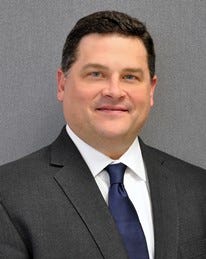Louisiana has improved its approach to disaster management, but that doesn’t mean it’s gotten any easier, according to the state’s emergency preparedness officer.
Challenges posed by natural disasters and the COVID-19 pandemic have made the past two and a half years the most difficult in recent state history, according to Casey Tingle, director of the Governor’s Office of Homeland Security and emergency preparedness.
On the heels of two of the most destructive hurricanes — Laura and Ida — in 2020 and 2021, residents and government agencies must act diligently as the state heads into its busiest hurricane season, it said. he told the Press Club of Baton Rouge at its weekly lunch on Monday.
“With so much to deal with for the state and our agency, and recovery always being complicated, there’s no two ways to handle this,” Tingle said.
Ongoing supply shortages persisted. Additionally, federal bureaucracy relegates much of the relief process to a sluggish pace. Despite these struggles, the state has taken a unique approach to disaster response, Tingle said.
Some comes from the partnership level of neighboring states, while much involves partnerships with the faith community, non-profit organizations and the private sector.
But even the most organized efforts cannot fully mitigate the impact of a major disaster, he said.
Much of southwestern Louisiana remains in poor condition after Hurricane Laura in 2020.
Meanwhile, much of the southeast Louisiana coastal region is far from recovered from Hurricane Ida, the third-worst storm to ever hit the Louisiana coast.
“In February and March, we totaled 5,000 mobile homes and 15,000 residents in the worst affected areas,” Tingle said. “Federal, local and state partnerships have aided in the temporary housing process. It’s never enough to meet the toughest needs, but it’s a useful step forward.
The state distributed 5,000 meals and 6 million bottles of water after Hurricane Ida.
After Ida, 26 more states sent personnel and teams to help the state in times of need, Tingle said.
Much of this assistance included sending state responders to Louisiana.
Issues with FEMA pose some of the biggest challenges after a disaster, Tingle said.
“FEMA always has money before, during and after necessary recovery work,” he said. “But large-scale housing requires congressional ownership, which takes a lot longer.
“There is a disconnect between the federal government and the states,” he said. “It’s a big challenge when it comes to displaced families.”
Some were first responders, while others helped in the emergency operations center.
Tingle urges residents to take advantage of the quiet time of the season to stock up on water and non-perishable food items.
He also recommended residents review their home insurance policy.
Also, they should keep in mind that flood insurance policies do not take effect until 30 days after the policy is purchased.

